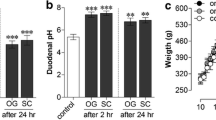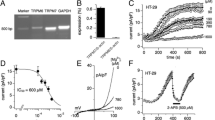Abstract
Proton pump inhibitors (PPIs) are potent blockers of gastric acid secretion, used by millions of patients suffering from gastric acid-related complaints. Although PPIs have an excellent safety profile, an increasing number of case reports describe patients with severe hypomagnesemia due to long-term PPI use. As there is no evidence of a renal Mg2+ leak, PPI-induced hypomagnesemia is hypothesized to result from intestinal malabsorption of Mg2+. The aim of this study was to investigate the effect of PPIs on Mg2+ homeostasis in an in vivo mouse model. To this end, C57BL/6J mice were treated with omeprazole, under normal and low dietary Mg2+ availability. Omeprazole did not induce changes in serum Mg2+ levels (1.48 ± 0.05 and 1.54 ± 0.05 mmol/L in omeprazole-treated and control mice, respectively), urinary Mg2+ excretion (35 ± 3 μmol/24 h and 30 ± 4 μmol/24 h in omeprazole-treated and control mice, respectively), or fecal Mg2+ excretion (84 ± 4 μmol/24 h and 76 ± 4 μmol/24 h in omeprazole-treated and control mice, respectively) under any of the tested experimental conditions. However, omeprazole treatment did increase the mRNA expression level of the transient receptor potential melastatin 6 (TRPM6), the predominant intestinal Mg2+ channel, in the colon (167 ± 15 and 100 ± 7 % in omeprazole-treated and control mice, respectively, P < 0.05). In addition, the expression of the colonic H+,K+-ATPase (cHK-α), a homolog of the gastric H+,K+-ATPase that is the primary target of omeprazole, was also significantly increased (354 ± 43 and 100 ± 24 % in omeprazole-treated and control mice, respectively, P < 0.05). The expression levels of other magnesiotropic genes remained unchanged. Based on these findings, we hypothesize that omeprazole inhibits cHK-α activity, resulting in reduced extrusion of protons into the large intestine. Since TRPM6-mediated Mg2+ absorption is stimulated by extracellular protons, this would diminish the rate of intestinal Mg2+ absorption. The increase of TRPM6 expression in the colon may compensate for the reduced TRPM6 currents, thereby normalizing intestinal Mg2+ absorption during omeprazole treatment in C57BL/6J mice, explaining unchanged serum, urine, and fecal Mg2+ levels.





Similar content being viewed by others
References
Alexander RT, Hoenderop JG, Bindels RJ (2008) Molecular determinants of magnesium homeostasis: insights from human disease. J Am Soc Nephrol 19:1451–1458
Bai JP, Hausman E, Lionberger R, Zhang X (2012) Modeling and simulation of the effect of proton pump inhibitors on magnesium homeostasis. 1. Oral absorption of magnesium. Mol Pharm 9:3495–3505
Broeren MA, Geerdink EA, Vader HL, van den Wall Bake AW (2009) Hypomagnesemia induced by several proton-pump inhibitors. Ann Intern Med 151:755–756
Coudray C, Demigne C, Rayssiguier Y (2003) Effects of dietary fibers on magnesium absorption in animals and humans. J Nutr 133:1–4
Cougnon M, Planelles G, Crowson MS, Shull GE, Rossier BC, Jaisser F (1996) The rat distal colon P-ATPase alpha subunit encodes a ouabain-sensitive H+, K+-ATPase. J Biol Chem 271:7277–7280
Cundy T, Dissanayake A (2008) Severe hypomagnesaemia in long-term users of proton-pump inhibitors. Clin Endocrinol 69:338–341
Cundy T, Mackay J (2011) Proton pump inhibitors and severe hypomagnesaemia. Curr Opin Gastroenterol 27:180–185
Danziger J, William JH, Scott DJ, Lee J, Lehman LW, Mark RG, Howell MD, Celi LA, Mukamal KJ (2013) Proton-pump inhibitor use is associated with low serum magnesium concentrations. Kidney Int 83:692–699
Doornebal J, Bijlsma R, Brouwer RM (2009) An unknown but potentially serious side effect of proton pump inhibitors: hypomagnesaemia. Ned Tijdschr Geneeskd 153:A711
Epstein M, McGrath S, Law F (2006) Proton-pump inhibitors and hypomagnesemic hypoparathyroidism. N Engl J Med 355:1834–1836
Fernandez-Fernandez FJ, Sesma P, Cainzos-Romero T, Ferreira-Gonzalez L (2010) Intermittent use of pantoprazole and famotidine in severe hypomagnesaemia due to omeprazole. Neth J Med 68:329–330
Fernandez-Fernandez FJ, Sesma P, Cainzos-Romero T, Ferreira L (2011) Hypomagnesemia related to the use of omeprazole with negative result for mutation in the TRPM6 gene. Med Clin (Barc) 137:188–189
Furlanetto TW, Faulhaber GA (2011) Hypomagnesemia and proton pump inhibitors: below the tip of the iceberg. Arch Intern Med 171:1391–1392
Gau JT, Yang YX, Chen R, Kao TC (2012) Uses of proton pump inhibitors and hypomagnesemia. Pharmacoepidemiol Drug Saf. doi:10.1002/pds.3224, Article first published online: 15 FEB 2012
Groenestege WM, Hoenderop JG, van den Heuvel L, Knoers N, Bindels RJ (2006) The epithelial Mg2+ channel transient receptor potential melastatin 6 is regulated by dietary Mg2+ content and estrogens. J Am Soc Nephrol 17:1035–1043
Hmu C, Moulik P, Macleod A (2009) Severe hypomagnesaemia due to lansoprazole. BMJ Case Rep (in press), published online 17 December 2009
Hoorn EJ, van der Hoek J, de Man RA, Kuipers EJ, Bolwerk C, Zietse R (2010) A case series of proton pump inhibitor-induced hypomagnesemia. Am J Kidney Dis 56:112–116
Kuipers MT, Thang HD, Arntzenius AB (2009) Hypomagnesaemia due to use of proton pump inhibitors—a review. Neth J Med 67:169–172
Lameris AL, Monnens LA, Bindels RJ, Hoenderop JG (2012) Drug-induced alterations in Mg2+ homoeostasis. Clin Sci (Lond) 123:1–14
Li M, Jiang J, Yue L (2006) Functional characterization of homo- and heteromeric channel kinases TRPM6 and TRPM7. J Gen Physiol 127:525–537
Mackay JD, Bladon PT (2010) Hypomagnesaemia due to proton-pump inhibitor therapy: a clinical case series. Qjm-an Int J Med 103:387–395
McKeage K, Blick SK, Croxtall JD, Lyseng-Williamson KA, Keating GM (2008) Esomeprazole: a review of its use in the management of gastric acid-related diseases in adults. Drugs 68:1571–1607
Nair AV, Hocher B, Verkaart S, van Zeeland F, Pfab T, Slowinski T, Chen YP, Schlingmann KP, Schaller A, Gallati S, Bindels RJ, Konrad M, Hoenderop JG (2012) Loss of insulin-induced activation of TRPM6 magnesium channels results in impaired glucose tolerance during pregnancy. Proc Natl Acad Sci U S A 109:11324–11329
Nakamura M, Matsui H, Serizawa H, Tsuchimoto K (2007) Lansoprazole novel effector sites revealed by autoradiography: relation to Helicobacter pylori, colon, esophagus and others. J Clin Biochem Nutr 41:154–159
Olbe L, Carlsson E, Lindberg P (2003) A proton-pump inhibitor expedition: the case histories of omeprazole and esomeprazole. Nat Rev Drug Discov 2:132–139
Phillips DH, Hewer A, Osborne MR (1992) Interaction of omeprazole with DNA in rat tissues. Mutagenesis 7:277–283
Quamme GA (2008) Recent developments in intestinal magnesium absorption. Curr Opin Gastroenterol 24:230–235
Rechkemmer G, Frizzell RA, Halm DR (1996) Active potassium transport across guinea-pig distal colon: action of secretagogues. J Physiol-Lond 493:485–502
Regolisti G, Cabassi A, Parenti E, Maggiore U, Fiaccadori E (2010) Severe hypomagnesemia during long-term treatment with a proton pump inhibitor. Am J Kidney Dis 56:168–174
Sachs G, Shin JM, Vagin O, Lambrecht N, Yakubov I, Munson K (2007) The gastric H, K ATPase as a drug target: past, present, and future. J Clin Gastroenterol 41(Suppl 2):S226–S242
Schlingmann KP, Waldegger S, Konrad M, Chubanov V, Gudermann T (2007) TRPM6 and TRPM7—gatekeepers of human magnesium metabolism. Biochim Biophys Acta-Mol Basis of Dis 1772:813–821
Serfaty-Lacrosniere C, Wood RJ, Voytko D, Saltzman JR, Pedrosa M, Sepe TE, Russell RR (1995) Hypochlorhydria from short-term omeprazole treatment does not inhibit intestinal absorption of calcium, phosphorus, magnesium or zinc from food in humans. J Am Coll Nutr 14:364–368
Shao J, Gumz ML, Cain BD, Xia SL, Shull GE, van Driel IR, Wingo CS (2010) Pharmacological profiles of the murine gastric and colonic H, K-ATPases. Biochim Biophys Acta 1800:906–911
Sorensen MV, Matos JE, Praetorius HA, Leipziger J (2010) Colonic potassium handling. Pflugers Arch 459:645–656
Swarts HG, Koenderink JB, Willems PH, De Pont JJ (2007) The human non-gastric H, K-ATPase has a different cation specificity than the rat enzyme. Biochim Biophys Acta 1768:580–589
Tamura T, Sakaeda T, Kadoyama K, Okuno Y (2012) Omeprazole- and esomeprazole-associated hypomagnesaemia: data mining of the public version of the FDA Adverse Event Reporting System. Int J Med Sci 9:322–326
Tari A, Wu V, Sumii M, Sachs G, Walsh JH (1991) Regulation of rat gastric H+/K+-ATPase alpha-subunit messenger-RNA by omeprazole. Biochim Biophys Acta 1129:49–56
Thebault S, Alexander RT, Tiel Groenestege WM, Hoenderop JG, Bindels RJ (2009) EGF increases TRPM6 activity and surface expression. J Am Soc Nephrol 20:78–85
Watanabe T, Suzuki T, Suzuki Y (1990) Ouabain-sensitive K+-ATPase in epithelial-cells from guinea-pig distal colon. Am J Physiol 258:G506–G511
Acknowledgments
We kindly thank Henk Arnts and Jeroen Mooren for technical assistance and Dr. Joost Drenth for critical reading of the manuscript. This study was supported by the Netherlands Organization for Scientific Research [TOP ZonMw 91208026, NWO-ALW 818.02.001], a EURYI award from the European Science Foundation and the Dutch Kidney Foundation [C08.2252] and EURenOmics funding from the European Union seventh Framework Programme (FP7/2007-2013, agreement n° 305608). Mark Hess was supported by a grant of the Institute for Genetic and Metabolic Disease (IGMD) of the Radboud University Nijmegen Medical Centre.
Author information
Authors and Affiliations
Corresponding author
Rights and permissions
About this article
Cite this article
Lameris, A.L.L., Hess, M.W., van Kruijsbergen, I. et al. Omeprazole enhances the colonic expression of the Mg2+ transporter TRPM6. Pflugers Arch - Eur J Physiol 465, 1613–1620 (2013). https://doi.org/10.1007/s00424-013-1306-0
Received:
Revised:
Accepted:
Published:
Issue Date:
DOI: https://doi.org/10.1007/s00424-013-1306-0




